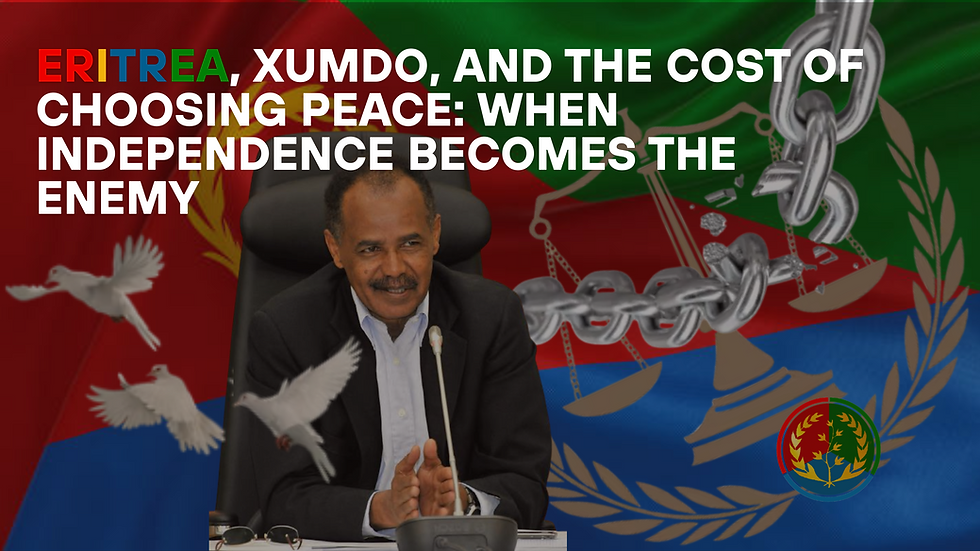The Trump Illusion: What His Africa Policy Really Reveals About U.S. Intentions
- Nakfa Eritrea
- May 23, 2025
- 3 min read
The Illusion of Change
In recent years, a growing number of Africans and members of the diaspora have found themselves caught in a whirlwind of Western political theater, hoping that outsider figures like Donald Trump might disrupt the exploitative systems of global power. For many, Trump’s anti-establishment rhetoric was interpreted as a potential break from the globalist policies that have long undermined African sovereignty.
But this illusion has quickly unraveled.
Trump's most recent public ambush of South Africa's President has reignited a hard truth: no American president, regardless of party, has ever prioritized the dignity, sovereignty, or prosperity of Africa. And those who believed Trump would be any different are now confronting the painful reality that he is simply another figurehead executing the empire’s agenda.
From the beginning of his presidency, Trump wasted no time in making his views clear. His now-infamous "shithole countries" comment reflected a deep-rooted disdain—not just for Africa, but for any nation not subservient to Western dictates. This was not a moment of misplaced language. It was a revelation of ideology.
AFRICOM’s Silent Expansion
While mainstream media obsessed over Trump’s tweets, a more sinister agenda was unfolding quietly behind the scenes: the expansion of AFRICOM’s covert military operations across the African continent. Drone bases, surveillance programs, and proxy training missions flourished under his administration. Rather than dismantling the mechanisms of empire, Trump strengthened them—especially in regions where African nations were attempting to resist Western influence.
In countries like Niger, Cameroon, and Somalia, U.S. military footprints expanded under the guise of counterterrorism. But history has shown that these “counterterror” campaigns often serve as smokescreens for resource control, destabilization, and the suppression of anti-imperialist governments.
Nowhere is this more evident than in the growing hostility toward Burkina Faso's revolutionary leader, Ibrahim Traoré. Under Traoré, Burkina Faso has moved to reject Western military aid, reclaim its gold mines, and reestablish control over its national destiny. In return, the West—under both Biden and Trump’s influence—has labeled him a threat, working behind the scenes to sabotage the country's progress.
A Familiar Pattern
The pattern is all too familiar. U.S. presidents—whether Bush, Obama, Trump, or Biden—present different faces to the world, but the machinery behind them remains unchanged. Each administration promotes the illusion of choice while operating from the same imperial playbook: support puppet regimes, exploit natural resources, crush self-determined leadership, and manipulate public perception through media control.
Trump’s base may have believed he would dismantle the "deep state," but in Africa, all we saw was business as usual: more weapons, more drones, more manipulation.
The worst betrayal, however, comes not from Trump, but from certain African leaders who continue to dance to America's tune. Rather than walk the path of dignity and independence, some leaders still line up for photo ops and empty promises—only to be publicly disrespected, discarded, and used as tools in someone else’s political game.
This is not diplomacy. It is neocolonial theater.
The Leaders Who Don’t Bend
But not all African leaders are playing this game. President Isaias Afwerki of Eritrea and President Ibrahim Traoré of Burkina Faso have demonstrated what it means to stand firm. They do not rush to Washington when summoned. They do not trade national sovereignty for short-term gains. And they do not allow their people to be shamed on the global stage.
This is why the West despises them. Not because they are corrupt. Not because they are tyrants. But because they are independent.
Their refusal to submit is a threat—not to democracy—but to the international systems of control that depend on compliant leaders. When Eritrea rejected IMF and World Bank aid, it wasn’t rejecting help; it was rejecting financial chains. When Burkina Faso expelled French troops, it wasn’t inviting chaos; it was declaring that Africa belongs to Africans.
Trump, like every president before him, represents the interests of an empire that sees Africa not as a partner, but as a possession. Until we stop seeking saviors from Western halls of power and begin to uplift the leaders who resist them, Africa’s liberation will remain out of reach.
It’s time to wake up from the Trump illusion. This is not a battle of political parties—it’s a war for Africa’s future. And that war will not be won by begging for respect from those who profit off our oppression. It will be won by standing with those who never bent the knee.
.png)



Comments